If you are looking to improve your digestive health, consider incorporating whole grains into your daily diet. Whole grains are a nutrient-rich food group that can provide numerous benefits for your digestive system and overall well-being.
Whole grains are an essential source of fiber, vitamins, minerals, and antioxidants that can support healthy digestion, maintain a healthy weight, and reduce the risk of chronic diseases such as heart disease, type 2 diabetes, and certain cancers.
By choosing whole grains over refined grains, you are providing your body with more nutrients and beneficial properties that can help improve your digestive system and promote a healthier gut. Let’s explore the specific digestive benefits of whole grains and learn how to incorporate them into your diet.
Ключевые выводы:
- Whole grains are an essential source of fiber, vitamins, minerals, and antioxidants that can support healthy digestion and reduce the risk of chronic diseases.
- Incorporating whole grains into your diet can promote a healthier gut and improve your digestive system.
- Choosing whole grains over refined grains can provide your body with more nutrients and beneficial properties for overall well-being.
- By incorporating whole grains into your daily diet, you can enjoy improved digestion, reduced inflammation, and better nutrient absorption.
- Whole grains can benefit children’s digestive health and are an essential component of a balanced diet.
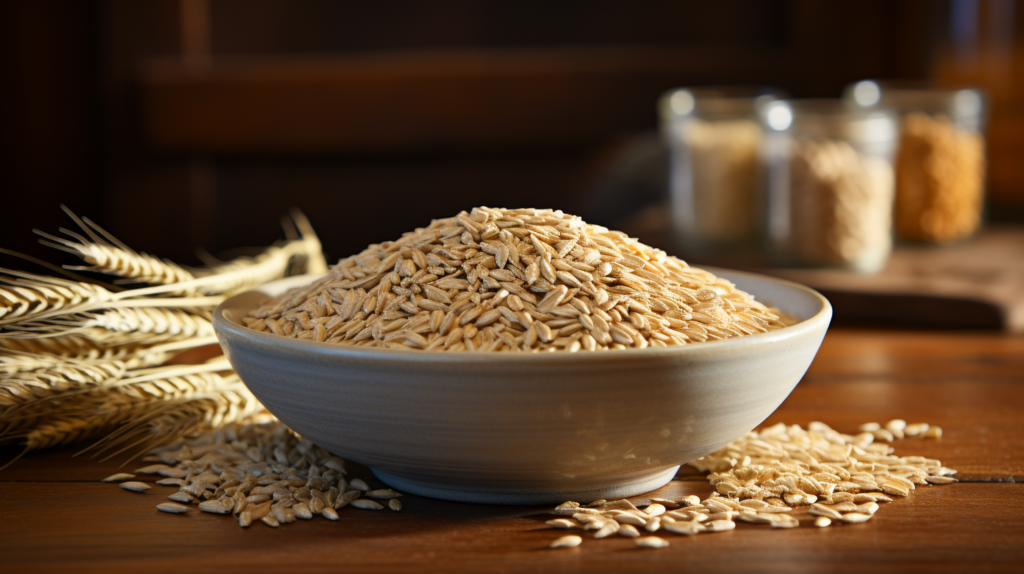
Understanding Digestive Health and Its Importance
When it comes to maintaining optimal health, digestive health should not be overlooked. Digestive health refers to the proper functioning of the digestive system, which includes the gastrointestinal tract, liver, pancreas, and gallbladder. The digestive system is responsible for breaking down food into nutrients that can be absorbed and used by the body.
Incorporating whole grains into your daily diet can significantly improve digestive health. Whole grains, such as brown rice, quinoa, and barley, provide essential nutrients and fiber that support healthy digestion.
Without proper digestive health, the body cannot absorb the nutrients it needs to function properly. This can lead to a range of health issues, including nutrient deficiencies, inflammation, and digestive disorders.
How Digestive Health Impacts Overall Health
The digestive system has a direct impact on overall health and well-being. A healthy digestive system supports the immune system, helps regulate mood, and contributes to maintaining a healthy weight.
When the digestive system is not functioning correctly, it can lead to a range of health issues. For example, a lack of fiber in the diet can cause constipation, while excessive intake of sugar and processed foods can contribute to inflammation and digestive disorders.
The Importance of Whole Grains for Digestive Health
Whole grains are an essential component of a healthy diet, particularly for digestive health. They contain high levels of fiber, which aids in digestion, and essential vitamins and minerals, such as B vitamins and iron.
Consuming whole grains regularly can help prevent constipation and regulate bowel movements. Additionally, whole grains contain prebiotics that feed the beneficial gut bacteria and promote a diverse microbiota, which is essential for optimal digestive health.
Research has also shown that consuming whole grains can reduce the risk of digestive disorders such as colorectal cancer, diverticulitis, and inflammatory bowel disease.
How to Incorporate Whole Grains into Your Diet
There are many different types of whole grains available, including brown rice, quinoa, bulgur, and oatmeal. To incorporate whole grains into your diet, try swapping out refined grains, such as white bread and pasta, for their whole grain counterparts.
You can also add whole grains to meals in creative ways. For example, add brown rice to stir-fries or quinoa to salads. Whole grain bread and crackers are also great options for sandwiches and snacks.
It’s essential to read labels carefully when purchasing whole grain products. Look for products that list a whole grain, such as “whole wheat,” as the first ingredient on the label.
Incorporating whole grains into your diet is a simple yet effective way to support digestive health and improve overall well-being.
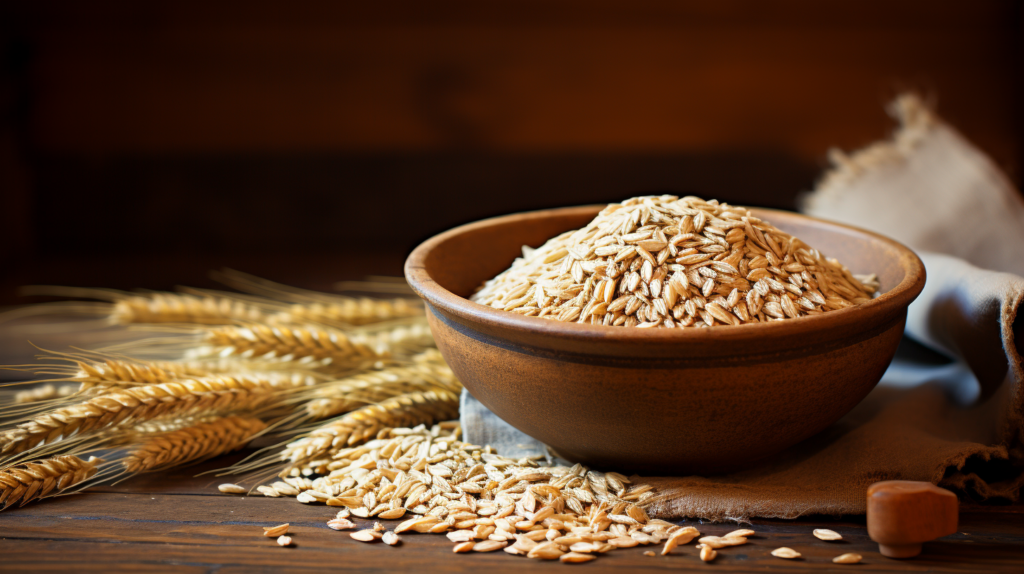
What Are Whole Grains?
Before we discuss the benefits of whole grains for the digestive system, let’s define what whole grains are. Whole grains are grains that contain the entire grain kernel, including the bran, germ, and endosperm. This is different from refined grains, which only include the endosperm.
Whole grains come in many different varieties, including wheat, oats, brown rice, quinoa, and barley, among others. The variety you choose depends on your taste preferences and dietary needs.
Whole Grains vs. Refined Grains
Refined grains are grains that have been stripped of their outer layers during processing. This removes the bran and germ, along with a significant amount of fiber, vitamins, and minerals. Refined grains are often used in processed foods like white bread, pasta, and baked goods.
On the other hand, whole grains are a better option for digestive health since they contain the entire grain kernel, including the nutrient-rich bran and germ. This provides more fiber, vitamins, and minerals that are essential for maintaining a healthy digestive system.
Incorporating Whole Grains into Your Diet
There are numerous ways to incorporate whole grains into your diet. Try swapping out white bread for whole grain bread, or using brown rice instead of white rice. Experiment with different types of whole grain pasta or try oatmeal for breakfast instead of sugary cereals.
| Example Whole Grains: | Description: |
|---|---|
| Wheat: | A versatile grain used in bread, pasta, and cereals. |
| Oats: | A fiber-rich grain used in oatmeal, granola, and baked goods. |
| Brown Rice: | A nutrient-dense grain used in many dishes, including sushi. |
| Quinoa: | A protein-packed grain used in salads, stir-fries, and as a rice substitute. |
By incorporating whole grains into your diet, you can reap the digestive benefits they offer and promote a healthier gut. Remember to choose whole grains over refined grains whenever possible and experiment with different types to find what works best for you.
Fiber Content in Whole Grains for Digestion
Whole grains are a rich source of dietary fiber, which plays a crucial role in maintaining digestive health. The fiber in whole grains adds bulk to your stool, making it easier to pass through the digestive tract.
There are two types of dietary fiber – soluble and insoluble. Soluble fiber dissolves in water and forms a gel-like substance in the gut. It slows down digestion and helps regulate blood sugar levels. Insoluble fiber, on the other hand, doesn’t dissolve in water and adds bulk to the stool, preventing constipation.
Whole grains contain both types of fiber in varying amounts, making them an excellent addition to your diet for supporting proper digestion.
Fiber Content in Common Whole Grains
| Whole Grain | Total Fiber Per Cup (cooked) | Растворимая клетчатка | Нерастворимая клетчатка |
|---|---|---|---|
| Овес | 4g | 2g | 2g |
| Brown Rice | 3.5g | 1g | 2.5g |
| Ячмень | 6g | 1g | 5g |
| Киноа | 5g | 2g | 3g |
As you can see from the table, different whole grains vary in their fiber content. Quinoa and barley have the highest fiber content per cup, while oats and brown rice have a slightly lower fiber content.
Recommended Daily Intake of Fiber
The recommended daily intake of fiber for adults is 25-30 grams per day. However, most people only consume around 15 grams per day, which is far below the recommended amount.
Incorporating whole grains into your daily diet is an easy way to increase your fiber intake and support proper digestion. Start by replacing refined grains such as white bread, pasta, and rice with whole grain options like whole wheat bread, brown rice, and quinoa.
However, it’s essential to increase your fiber intake gradually to prevent digestive discomfort. Drinking plenty of water and staying physically active can also help support the digestive process.
Overall, the high fiber content of whole grains makes them an excellent choice to promote optimal digestion and overall health. Ensure you consume enough fiber daily by adding a variety of whole grains to your diet.
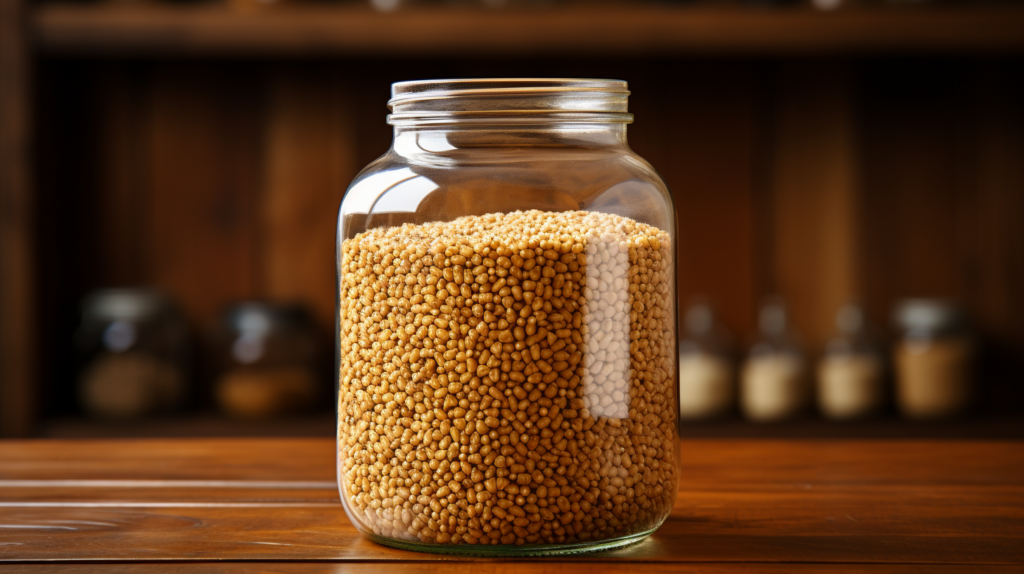
Whole Grains and Gut Health
When it comes to maintaining good digestive health, one of the key factors to consider is the health of your gut. Your gut is home to trillions of bacteria, collectively known as the microbiome, which play a crucial role in digestion, immune function, and overall health.
Incorporating whole grains into your diet can be an effective way to promote a healthy gut microbiome and support optimal digestion. With their high fiber content and other beneficial nutrients, whole grains provide the fuel that your gut bacteria need to thrive.
The Role of Gut Bacteria
Research has shown that maintaining a healthy balance of gut bacteria is essential for overall health. Your gut bacteria help to break down food, synthesize vitamins, and support immune function. They also play a role in regulating inflammation and metabolism.
However, various factors, including a diet high in processed foods, antibiotics, and stress, can disrupt the balance of bacteria in your gut and lead to digestive problems.
How Whole Grains Support a Healthy Gut
Whole grains provide a range of nutrients that support the growth and diversity of gut bacteria. In particular, the fiber found in whole grains acts as a prebiotic, feeding the beneficial bacteria in your gut and promoting a healthy balance of microbes.
Whole grains also contain other nutrients, such as vitamins, minerals, and antioxidants, that help to support optimal digestive function and protect against inflammation.
Recommended Whole Grains for Gut Health
While all whole grains can provide digestive benefits, some options are particularly well-suited for supporting a healthy gut.
| Whole Grain | Digestive Benefits |
|---|---|
| Овес | Contain beta-glucan, a type of soluble fiber that may improve gut health and reduce inflammation. |
| Brown Rice | Rich in fiber, vitamins, and minerals that support digestive function and may reduce the risk of digestive disorders. |
| Ячмень | Contains beta-glucan and other nutrients that support a healthy gut microbiome and can reduce inflammation. |
How to Incorporate Whole Grains into Your Diet
There are many simple and delicious ways to add whole grains to your daily diet. Try swapping refined grains for whole grain options, such as brown rice, whole wheat bread, and quinoa. You can also experiment with different types of whole grains, such as farro, bulgur, and millet, to add variety to your meals.
Additionally, incorporating more fruits, vegetables, and other fiber-rich foods into your diet can further support optimal digestive function.
By making whole grains a staple in your diet, you can support the health of your gut and promote optimal digestive function.

Whole Grains and Improved Digestion
Integrating whole grains into your diet can significantly improve your digestive health. Whole grains are an excellent source of dietary fiber, which is crucial for maintaining a healthy digestive system. Consuming a diet rich in whole grains can prevent constipation, regulate bowel movements, and enhance the overall digestive process.
Whole grains contain two types of fiber: soluble and insoluble. Soluble fiber dissolves in water and forms a gel-like substance that slows down digestion. It helps regulate blood sugar levels and lowers cholesterol. Insoluble fiber adds bulk to stool, making it easier to pass through the digestive system. It also helps prevent constipation and aids in weight management.
One way whole grains promote improved digestion is by feeding the beneficial bacteria in your gut. These bacteria break down the fiber in whole grains, producing short-chain fatty acids that promote a healthy gut microbiome. A healthy gut microbiome, in turn, can improve digestion and support overall health.
Including a variety of whole grains in your diet can provide numerous digestive benefits. Some of the best whole grains for improved digestion include:
| Whole Grain | Преимущества |
|---|---|
| Whole wheat | High in fiber, promotes regular bowel movements |
| Коричневый рис | High in fiber, improves stool consistency |
| Овес | High in soluble fiber, helps regulate blood sugar and cholesterol levels |
| Киноа | High in insoluble fiber, aids in digestion and weight management |
When incorporating whole grains into your diet, it’s essential to choose high-quality, unrefined grains. These grains retain their nutrient-rich outer layer, or bran, and germ, which contains vitamins, minerals, and antioxidants. Choose whole grains in their natural form or minimally processed, without added sugars, salt, or preservatives.
Whole grains can be enjoyed in a variety of ways, including as a side dish, in salads, or as a main meal. There are also several creative and nutritious recipes that feature whole grains. Experiment with different types of whole grains and preparation methods to find what works best for you and your digestive health.
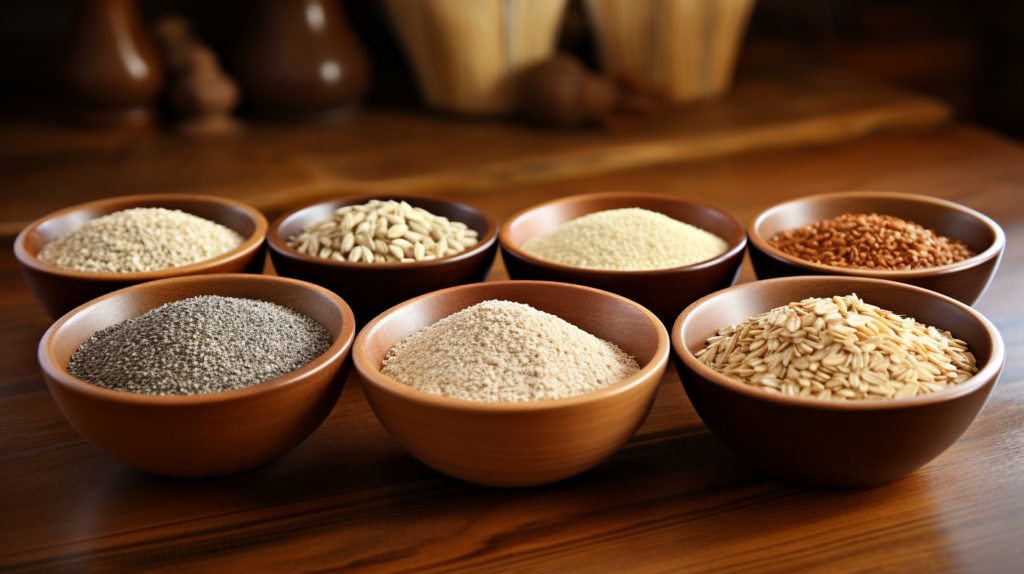
The Role of Whole Grains in Nutrient Absorption
Whole grains not only provide essential nutrients but also play a vital role in the absorption of nutrients from other foods.
When you consume whole grains, the fiber they contain acts as a prebiotic, feeding the beneficial bacteria in your gut. These bacteria help break down and ferment the complex carbohydrates in whole grains, releasing nutrients that your body can then absorb.
Additionally, the fiber in whole grains slows down the absorption of carbohydrates, allowing for a steadier and more sustained release of energy. This can help prevent blood sugar spikes and crashes, providing a stable source of energy throughout the day.
The Benefits of Whole Grains for Gut Health
As mentioned earlier, the gut microbiome plays a critical role in nutrient absorption. Whole grains can help promote a healthy and diverse gut microbiota, supporting optimal digestion and overall health.
When the beneficial bacteria in your gut are well-fed and thriving, they produce short-chain fatty acids (SCFAs) that provide energy for the cells lining your gut. These cells then function optimally, improving nutrient absorption. SCFAs can also reduce inflammation in the gut, further improving digestive wellness.
In summary, incorporating whole grains into your diet can enhance nutrient absorption, promote a healthy gut microbiome, and support optimal digestion.
Whole Grains and Reduced Inflammation
Inflammation is a natural response of the body to injury or infection. However, chronic inflammation can lead to various health issues, including digestive discomfort and disease. Fortunately, whole grains contain nutrients that can help reduce inflammation in the gut and promote digestive wellness.
Whole grains are high in antioxidants, including phenolic compounds and vitamin E, which help neutralize free radicals in the body. Free radicals can damage cells and contribute to inflammation. By consuming whole grains regularly, you provide your body with a steady supply of antioxidants to combat inflammation and promote overall health.
Whole grains are also a good source of fiber, which has been shown to reduce levels of C-reactive protein (CRP), a marker of inflammation in the body. In a study of over 10,000 American adults, those who consumed the most fiber had the lowest levels of CRP.
Furthermore, whole grains contain phytochemicals, such as lignans and saponins, which have anti-inflammatory properties. These compounds have been shown to reduce inflammation in various parts of the body, including the gut.
Incorporating whole grains into your daily diet is an excellent way to reduce inflammation in the gut and promote digestive wellness.

Choosing and Preparing Whole Grains for Digestive Health
Now that you understand the digestive benefits of whole grains, it’s time to learn how to choose and prepare them to maximize their benefits for your gut health.
When choosing whole grains, look for options such as brown rice, quinoa, barley, whole wheat bread, and oatmeal. These grains are high in fiber, vitamins, and minerals, making them excellent choices for digestive health.
When preparing whole grains, it’s essential to follow the cooking instructions carefully. Overcooking or undercooking can affect the grain’s texture and reduce its nutritional value. Rinse grains thoroughly before cooking to remove any dirt or debris.
Here is a simple recipe to prepare brown rice:
Easy Brown Rice Recipe:
- 1 cup brown rice
- 2 cups water
- 1/2 tsp salt
Инструкции:
- Rinse the brown rice in a fine mesh sieve under running water. Drain well.
- In a medium pot, bring the rinsed rice, water, and salt to a boil over high heat.
- Reduce the heat to low, cover the pot with a tight-fitting lid, and simmer for 40-45 minutes, or until the rice is tender and the water has been absorbed.
- Remove from the heat, fluff the rice with a fork, and let it sit covered for 5-10 minutes before serving.
Whole grains can also be incorporated into a variety of dishes, including salads, soups, and stir-fries. Experiment with different whole grain recipes to find the ones that work best for you and your family.
By incorporating whole grains into your diet and preparing them correctly, you can experience the numerous digestive benefits that come with these nutrient-rich foods.
Whole Grains and Weight Management
If you’re looking to maintain a healthy weight, incorporating whole grains into your daily diet can be a great way to do so. Whole grains provide a sense of fullness and satiety, which can prevent overeating and lead to weight loss or maintenance.
In fact, research has shown that individuals who consume whole grains regularly have lower body weight and BMI than those who consume refined grains. Whole grains are also an excellent source of fiber, which can help regulate blood sugar levels and reduce the risk of obesity-related diseases such as type 2 diabetes, heart disease, and certain types of cancer.
| Whole Grain | Calories per 1/2 Cup Serving | Fiber per 1/2 Cup Serving |
|---|---|---|
| Киноа | 111 | 2.6g |
| Brown Rice | 108 | 1.8g |
| Steel Cut Oats | 150 | 4g |
When choosing whole grains for weight management, it’s important to pay attention to portion sizes and avoid adding high-calorie toppings such as butter or sugar. Instead, opt for low-calorie toppings such as fresh fruit, nuts, and seeds to add flavor and nutrition to your meals.
Try swapping out refined grains for whole grains in your meals. For example, use quinoa instead of white rice or whole wheat pasta instead of regular pasta. Start with small changes and gradually increase your intake of whole grains. Over time, you’ll develop a taste for their nutty flavor and enjoy the benefits of improved weight management.
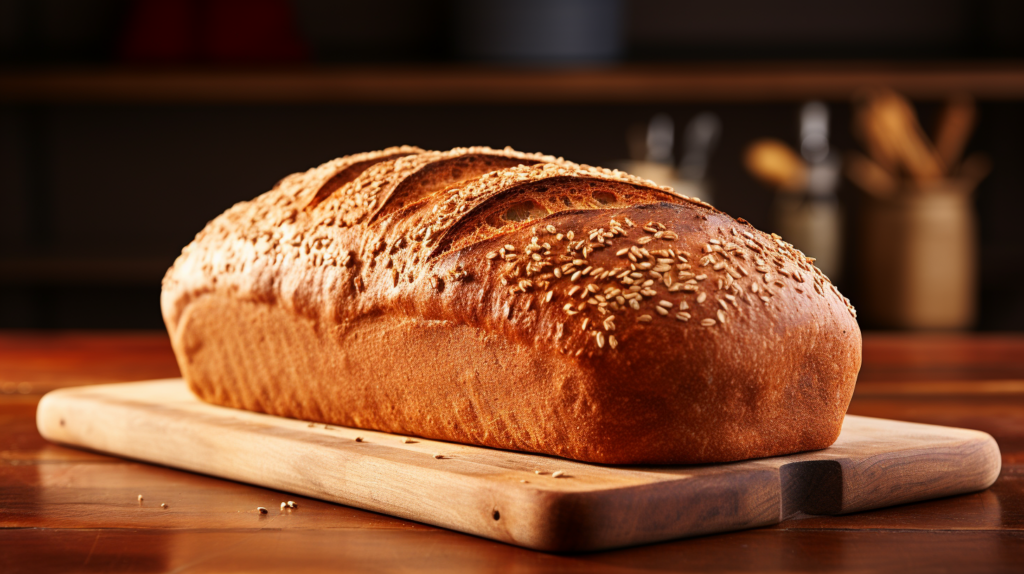
Whole Grains and Heart Health
Including whole grains in your daily diet can have a significant impact on your heart health. Studies have shown that consuming whole grains can lower your risk of heart disease, which is the leading cause of death in the United States.
Whole grains contain several heart-healthy nutrients, including fiber, vitamins, minerals, and antioxidants. The fiber in whole grains can help lower your cholesterol levels and reduce the risk of developing plaque in your arteries. Plaque buildup can lead to blockages and increase your risk of heart attack and stroke.
The vitamins and minerals found in whole grains, such as potassium, magnesium, and selenium, can also support heart health. Potassium helps regulate your blood pressure, while magnesium and selenium can help reduce inflammation in your blood vessels.
Additionally, the antioxidants in whole grains can help protect your heart and reduce the risk of oxidative stress, which can damage your cells and increase the risk of chronic diseases.
Comparing Whole Grains to Refined Grains
It’s important to note that not all grains are created equal. Refined grains, such as white flour and white rice, have been processed, removing the nutrient-rich bran and germ. This leaves only the starchy endosperm, which is quickly digested and can cause a spike in blood sugar levels.
On the other hand, whole grains contain all three parts of the grain, including the bran, germ, and endosperm. This makes them more nutrient-dense and slower to digest, resulting in a slower and steadier release of glucose into your blood. This can help prevent blood sugar spikes and crashes, which can contribute to heart disease and other chronic conditions.
How to Incorporate Whole Grains into Your Diet
To reap the heart-healthy benefits of whole grains, aim to make them a staple in your daily diet. Choose whole grain options such as brown rice, quinoa, whole wheat bread, and whole grain pasta. Replace refined grains with whole grains whenever possible.
You can also experiment with adding whole grains to your favorite recipes, such as using quinoa instead of rice in a stir-fry or adding whole grain bread to your sandwich. Start small and gradually increase your intake of whole grains to help your body adjust.
Incorporating whole grains into your diet can have a significant impact on your heart health and overall well-being. Make the switch to whole grains and enjoy the delicious flavors and health benefits they have to offer.
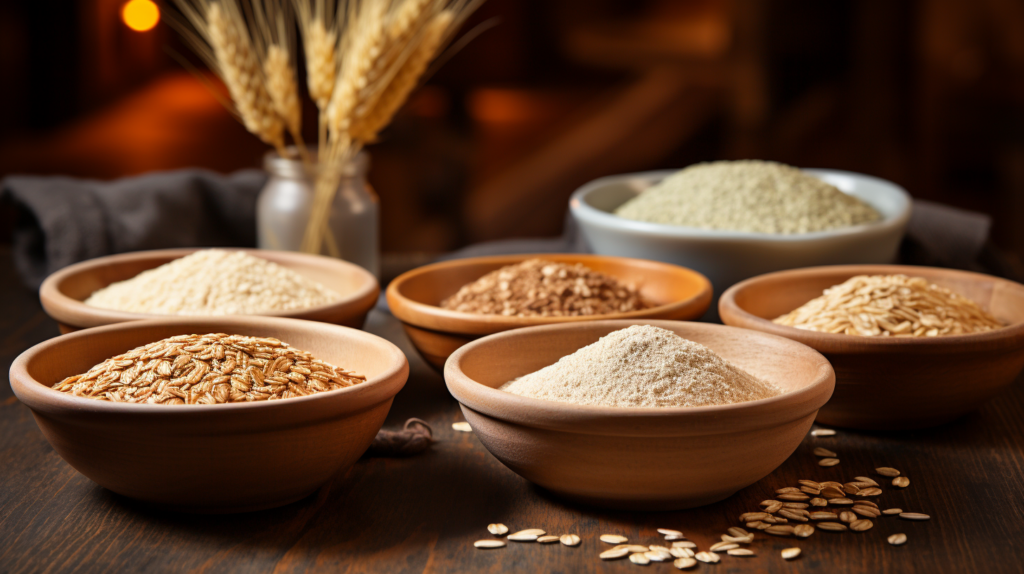
Whole Grains and Blood Sugar Control
Stable blood sugar levels are essential for maintaining good health, especially for individuals with diabetes or prediabetes. Whole grains offer a range of benefits for blood sugar control, making them a valuable addition to any diet.
Whole grains are a rich source of fiber, which slows down the absorption of glucose into the bloodstream, thereby preventing spikes in blood sugar levels. The specific types of fiber found in whole grains, such as beta-glucan and resistant starch, have been shown to have a significant impact on blood sugar control.
In addition, whole grains contain essential nutrients, such as magnesium, that contribute to better blood sugar regulation. Magnesium is involved in the metabolism of glucose and insulin, making it crucial for maintaining healthy blood sugar levels.
Several studies have shown that consuming whole grains can reduce the risk of developing type 2 diabetes. One study found that individuals who consumed at least two servings of whole grains per day had a 21% lower risk of developing type 2 diabetes compared to those who consumed less than one serving per week.
The Glycemic Index and Whole Grains
The glycemic index (GI) is a measure of how quickly a carbohydrate-containing food raises blood sugar levels. Foods with a high GI are rapidly absorbed and can cause blood sugar levels to spike, while foods with a low GI are absorbed more slowly and have a more gradual impact on blood sugar levels.
Whole grains typically have a low to moderate GI, making them a smart choice for individuals looking to control their blood sugar levels. The exact GI of a particular whole grain can vary based on factors such as cooking method and processing.
How to Incorporate Whole Grains for Blood Sugar Control
Incorporating whole grains into your diet is easy and delicious. Swap out refined grains for whole grain options, such as whole wheat bread, brown rice, and quinoa. Look for packaged foods that list whole grains as one of the first ingredients.
Try starting your day with a bowl of oatmeal topped with fresh fruit, or enjoy a whole grain salad for lunch. Whole grain snacks, such as popcorn or whole grain crackers, can also be a great option for keeping blood sugar levels stable throughout the day.
Remember to always check with your healthcare provider before making any significant dietary changes, especially if you have diabetes or other medical conditions.
Whole Grains and Digestive Disorders
If you suffer from a digestive disorder, incorporating whole grains into your daily diet may offer relief and support. Whole grains provide crucial nutrients and fiber that support healthy digestion, and their anti-inflammatory properties can help reduce symptoms of certain digestive disorders.
Понимание расстройств пищеварения
Digestive disorders can affect various parts of the digestive system, from the esophagus to the rectum. These conditions can cause symptoms such as abdominal pain, bloating, diarrhea, constipation, and nausea.
Some common digestive disorders include:
- Irritable bowel syndrome (IBS)
- Crohn’s disease
- Ulcerative colitis
- Diverticulitis
- Celiac disease
If you have been diagnosed with a digestive disorder, it’s crucial to work with a healthcare professional to manage your symptoms and develop a treatment plan.
Benefits of Whole Grains for Digestive Disorders
Whole grains can be particularly beneficial for individuals with certain digestive disorders. Here are some ways whole grains can support digestive health:
| Выгода | Описание |
|---|---|
| Lower inflammation | Whole grains contain anti-inflammatory properties that can help reduce inflammation in the gut, which is beneficial for conditions such as Crohn’s disease, ulcerative colitis, and diverticulitis. |
| Provide fiber | Whole grains are a good source of fiber, which can help regulate bowel movements and prevent constipation. This can be beneficial for individuals with conditions such as IBS and diverticulitis. |
| Supply essential nutrients | Whole grains provide key nutrients that may be lacking in people with certain digestive disorders, such as iron, zinc, and B vitamins. |
How to Incorporate Whole Grains into Your Diet
When incorporating whole grains into your diet for digestive health, it’s important to choose the right types of grains and prepare them correctly. Here are some tips:
- Choose whole grains such as whole wheat, brown rice, quinoa, and barley.
- Avoid refined grains, which have had the bran and germ removed and are lower in fiber and nutrients.
- Experiment with cooking methods such as boiling, baking, and stir-frying to find your favorite way to prepare whole grains.
- Incorporate whole grains into your meals gradually to give your digestive system time to adjust.
By incorporating whole grains into your daily diet, you can support your digestive health and potentially reduce symptoms of digestive disorders. Consult with your healthcare professional to determine whether whole grains are right for you.
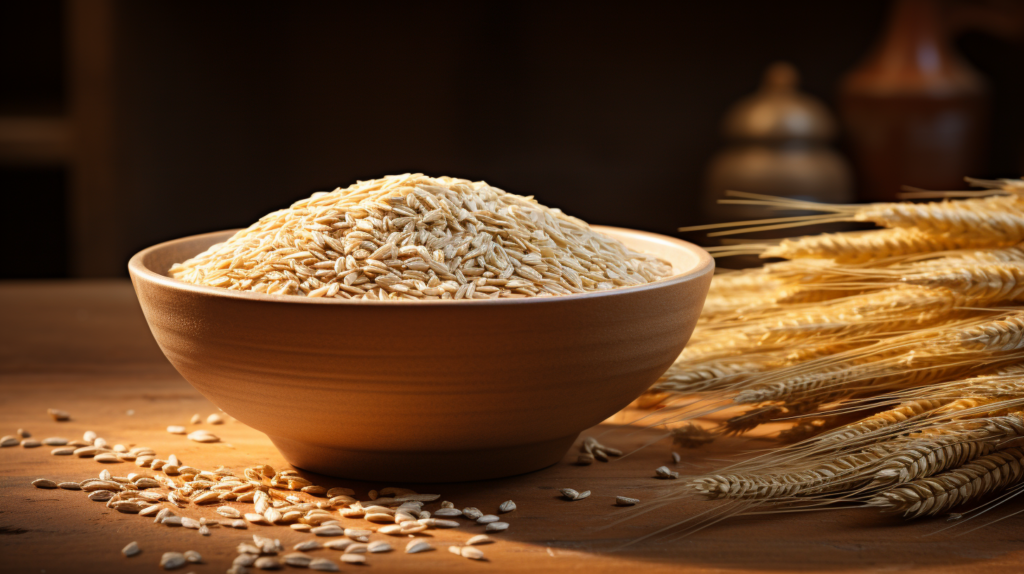
Whole Grains for Children’s Digestive Health
As a parent, you want the best for your child’s health and well-being. Incorporating whole grains into their diet is an excellent way to support their digestive health and overall growth and development.
Whole grains are an excellent source of fiber, which promotes healthy digestion and prevents constipation. The fiber in whole grains also helps regulate bowel movements and reduce the risk of digestive disorders, making it an essential component of a child’s diet.
In addition to fiber, whole grains contain essential nutrients such as vitamins, minerals, and antioxidants that support optimal health. Studies have also shown that whole grains can contribute to weight management and reduce the risk of chronic diseases such as heart disease and type 2 diabetes.
Whole grains can be easily incorporated into a child-friendly diet. Try swapping refined grains with whole grain options such as whole wheat bread, brown rice, and whole grain pasta. Experiment with different grains such as quinoa and farro to add variety to meals.
Here are some simple and nutritious whole grain recipes for kids:
- Whole grain pancakes made with whole wheat flour and topped with fresh fruit.
- Whole grain quesadillas made with whole wheat tortillas and filled with beans and veggies.
- Whole grain pizza with a whole wheat crust and topped with tomato sauce, cheese, and veggies.
- Whole grain granola bars made with oats, nuts, and dried fruit.
- Whole grain trail mix made with whole grain cereal, nuts, and dried fruit.
By incorporating whole grains into your child’s diet, you can support their digestive health and overall well-being. With these simple and nutritious recipes, your child can enjoy the benefits of whole grains while also enjoying delicious, kid-friendly meals.
Whole Grains and a Balanced Diet
Incorporating whole grains into your daily diet is an essential component of a balanced eating plan. Whole grains are packed with important nutrients such as fiber, vitamins, and minerals that promote overall health and well-being.
Experts recommend consuming at least three servings of whole grains daily for optimal health. A serving size is typically 1/2 cup of cooked grains, 1 slice of bread, or 1 cup of ready-to-eat cereal.
To maximize the digestive benefits of whole grains, it’s important to combine them with other nutrient-rich foods. Aim for a varied diet that includes plenty of fresh fruits, vegetables, lean proteins, and healthy fats.
Here are some examples of how you can incorporate whole grains into your daily meals:
- Start your day with a bowl of oatmeal topped with fresh fruit and nuts.
- Swap out refined white bread for 100% whole grain bread in your sandwiches.
- Add quinoa or brown rice to your lunchtime salad.
- Snack on whole grain crackers with hummus or nut butter.
- Choose whole wheat pasta for your dinner recipes.
By making simple swaps and adding whole grains to your meals, you can easily achieve a balanced and nutritious diet that supports optimal digestive health.

Заключение
Whole grains offer a multitude of benefits for your digestive health. By incorporating them into your daily diet, you can promote a healthier gut, improve digestion, and reduce the risk of digestive disorders.
It’s also important to remember that whole grains are just one component of a balanced diet, which should include a variety of nutrient-rich foods. By combining whole grains with fruits, vegetables, lean proteins, and healthy fats, you can maximize the health benefits of your meals.
Start Small
If you’re new to incorporating whole grains into your diet, start small. Try adding half a cup of cooked brown rice or quinoa to your meals, or swap out white bread for whole grain bread. Over time, you can gradually increase your intake of whole grains until they become a regular part of your diet.
Experiment with Recipes
Whole grains can be incorporated into a variety of recipes, from breakfast dishes to desserts. Experiment with different recipes and cooking methods to find new and delicious ways to enjoy whole grains.
Consult Your Doctor
If you have a digestive disorder or any other health condition, it’s important to consult with your doctor before making any significant changes to your diet. Your doctor can help you determine the best approach to incorporating whole grains into your meals.
Incorporating whole grains into your daily diet may take some time and effort, but the long-term benefits for your digestive health and overall well-being are worth it. Start small, experiment with new recipes, and consult with your doctor as needed. With time, you can enjoy the digestive benefits of whole grains as part of a healthy and balanced diet.
FAQ
What are the digestive benefits of incorporating whole grains into your daily diet?
Whole grains provide fiber and nutrients that support a healthy digestive system. They can help prevent constipation, regulate bowel movements, and reduce the risk of digestive disorders.
Почему здоровье пищеварительной системы важно?
Digestive health plays a crucial role in overall well-being. A healthy digestive system ensures the proper breakdown and absorption of nutrients, supports the immune system, and helps maintain a balanced gut microbiome.
What are whole grains?
Whole grains include the entire grain kernel, including the bran, germ, and endosperm. They are different from refined grains, which have had the bran and germ removed. Examples of whole grains include whole wheat, oats, brown rice, and quinoa.
How does the fiber content in whole grains benefit digestion?
Whole grains are high in fiber, which promotes healthy digestion. Fiber adds bulk to the stool, making it easier to pass through the digestive system. It also helps regulate bowel movements and supports the growth of beneficial gut bacteria.
How do whole grains promote gut health?
Whole grains can contribute to a healthy gut microbiome by providing nourishment for beneficial gut bacteria. They help maintain a diverse microbial community, which is essential for optimal digestion and overall health.
How do whole grains improve digestion?
Whole grains improve digestion by preventing constipation, regulating bowel movements, and reducing the risk of digestive disorders. They also aid in nutrient absorption and provide essential nutrients for overall digestive health.
How do whole grains enhance nutrient absorption?
Whole grains contain compounds that enhance nutrient absorption in the digestive system. They can increase the bioavailability of certain vitamins and minerals, ensuring that your body can effectively utilize these nutrients from other foods.
How do whole grains reduce inflammation in the gut?
Whole grains have anti-inflammatory properties that can help reduce inflammation in the digestive system. By reducing inflammation, they contribute to digestive wellness and promote a healthier internal environment.
How can I choose and prepare whole grains for digestive health?
When choosing whole grains, opt for options like whole wheat, oats, brown rice, and quinoa. Look for whole grain products with minimal processing. To prepare them, follow cooking methods and recipes that preserve their nutritional value and digestive benefits.
How can whole grains contribute to weight management?
Whole grains can help with weight management by providing a sense of fullness and preventing overeating. They are also nutrient-dense, which means you get more nutrients in each calorie consumed.
How do whole grains support heart health?
Whole grains have been linked to lower risk of heart disease. They can help lower cholesterol levels, reduce high blood pressure, support healthy blood vessels, and improve overall cardiovascular health.
How do whole grains affect blood sugar control?
Whole grains have a low glycemic index, which means they have a smaller impact on blood sugar levels compared to refined grains. Consuming whole grains can help stabilize blood sugar levels and reduce the risk of developing type 2 diabetes.
Can whole grains benefit individuals with digestive disorders?
Yes, whole grains can be beneficial for individuals with digestive disorders such as irritable bowel syndrome (IBS) and diverticulitis. However, it’s important to consider individual sensitivities and consult with a healthcare professional for personalized advice.
How can whole grains support children’s digestive health?
Whole grains provide essential nutrients and fiber that support children’s digestive health. Including whole grains in their diet can promote regular bowel movements and provide sustained energy throughout the day. There are also kid-friendly whole grain recipes available.
How do whole grains fit into a balanced diet?
Whole grains are an essential component of a balanced diet. They should be consumed in appropriate portion sizes and combined with other nutrient-rich foods such as fruits, vegetables, lean proteins, and healthy fats.














